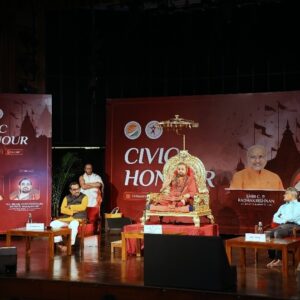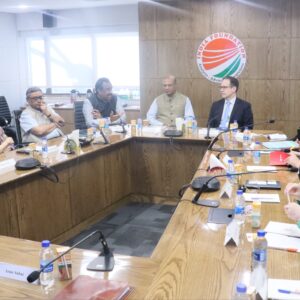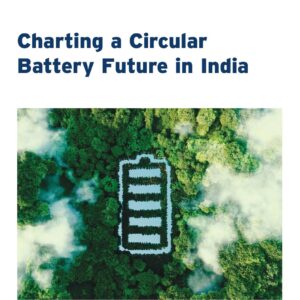India Foundation organized a two-day National Seminar on ‘Integral Humanism in Indian Thought’ at the Nehru Memorial Museum and Library, New Delhi on 19-20 September, 2016. The seminar saw attendance from noted academicians, activists and students. The event started with floral tributes to Deendayal Upadhayay on the occasion of his centenary birth anniversary.
Deendayal was born on 25 September, 2016 at a small village in the Mathura district of Uttar Pradesh in North India. He was a social worker, educationist, economist, journalist, orator and above all a masterful organizer of men committed to the cause of nation-building in those turbulent days.
The Inaugural Session of the Conference was addressed by key thinkers of the day. Shri Mukul Kanitkar spoke of how Deendayal’s Integral Humanism is a holistic philosophy of our times and not merely an ideology meant to be used in a particular time and situation. He distinguished Deendayal’s Integral Humanism from M.N. Roy’s conception of Radical Humanism. He noted that the latter is bereft of any shade of spiritualism – something that cannot be divorced from humanism in the long run.
Highlighting the role of Integral Humanism in shaping India’s Education Policy for the 21st century, he observed that Deendayal’s vision accorded full space to diversity of views and opinions. Much in the same way that no two men look the same, none should be expected to think the same per force or compulsion. He also observed that this vision was not only relevant during the days of struggle but also in times when the people alighted by this thought have assumed power to change India for better.
 Dr. Mahesh Chandra Sharma started his address by equating Integral Humanism with the entirety of the Indian political thought. He quoted from the Vedas to our contemporary times. He noted that Vedic invocations of ‘ekam sat vipra bahuda vadanti’ meaning ‘truth is one, sages call it by various names’ and ‘mata bhumi putro ham prithiviyah’ meaning that ‘Earth is my mother and I am her son’ are the essence of Indian thought and that they inform every corner of Deendayal’s Integral Humanism. He also noted that this branch of sociological research eschews the false binaries of good or bad, thereby, opening a wide field for ideas that are both good and bad. This grey area is the plane where we have to find out our path of consensus through debates and discussions. Indian society, he shared, operates on the model of consensus.
Dr. Mahesh Chandra Sharma started his address by equating Integral Humanism with the entirety of the Indian political thought. He quoted from the Vedas to our contemporary times. He noted that Vedic invocations of ‘ekam sat vipra bahuda vadanti’ meaning ‘truth is one, sages call it by various names’ and ‘mata bhumi putro ham prithiviyah’ meaning that ‘Earth is my mother and I am her son’ are the essence of Indian thought and that they inform every corner of Deendayal’s Integral Humanism. He also noted that this branch of sociological research eschews the false binaries of good or bad, thereby, opening a wide field for ideas that are both good and bad. This grey area is the plane where we have to find out our path of consensus through debates and discussions. Indian society, he shared, operates on the model of consensus.
Prof S.R. Bhatt delivered his presidential remarks to mark out that the idea of Integral Humanism is a holistic philosophy relevant not only in the past but also in present times. He said that chains of time and age do not bind this thought. Hence, he said that it isn’t a mere ideology represented by an ‘ism’ like many contemporary thoughts.
Prof Bhatt further remarked that Deendayal was both a thinker and a practitioner whose thought had both an ideological as well as a practical panache. On the front of ideology, Prof Bhatt noted, he was open to new ideas and on his practical side, he visualized that all the material creation is to be understood as human achievement. This, Prof Bhatt argued, does not mean that man is the measure of everything as encapsulated in the western thought.
Instead, the Indian mind comprehends the human being as ‘purusha’ who is all encompassing, Prof Bhatt said. It is man who makes society, which later becomes a nation. It is these nations, Prof Bhatt said, that finally constitute the world. Purusha is the best embodiment of Indian thought that identifies with unity in diversity and diversity in unity, Prof Bhatt argued. He asserted that integrity of human existence is what constitutes the essence of Integral Humanism of Deendayal.
Prof Bhatt further observed that all struggle, violence, hatred and jealousy are artificial and have no place in Indian thought. He further noted that Modi government’s programs like Jan Dhan Yojna, Swachh Bharat Abhiyan, Beti Bachao Beti Padhao Yojna, Krishi Sinchai Yojna, Kaushal Vikas Yojna, Mudra Yojna, etc. are being implemented with this thought process in mind.
Prof. S.P. Mani gave his address a fitting start by recalling the Vedic dictums of ‘sarve bhavantu sukhina, sarve santu niramaya’ and ‘ten takten bhunjitah’ as the core or the foundational principles of Integral Humanism. He observed that balance is the key to success, whether in material pursuits or in the spiritual world. He outlined that Deendayal used sangam sanskriti to give India her swaroop. He argued that the essential features of India’s swaroop include acceptance, validation, celebration, gender justice and sustainable development.
 In his remarks Prof. K.B. Pandya raised the question, “What is India’s ‘chiti’?” He urged to locate the answer to this question in India’s own store house of wisdom- Ramayana and Mahabharata. Dr. Ashok Modak in his enlightening remarks took up the task of identifying the key features of Deendayal’s conception of Integral Humanism and noted that service to motherland, optimism of the Indian mind, spirituality, integrity, openness to change and the holistic approach to deal with issues are key themes within that thought strain.
In his remarks Prof. K.B. Pandya raised the question, “What is India’s ‘chiti’?” He urged to locate the answer to this question in India’s own store house of wisdom- Ramayana and Mahabharata. Dr. Ashok Modak in his enlightening remarks took up the task of identifying the key features of Deendayal’s conception of Integral Humanism and noted that service to motherland, optimism of the Indian mind, spirituality, integrity, openness to change and the holistic approach to deal with issues are key themes within that thought strain.
Prof. K.C. Pandey spoke on ‘Integral Humanism and Ancient Indian Thought’. His address was focused on how consciousness is the foundation of all that exists. Mr. Govardhan Bhatt elaborated on the need of synergy between science and spirituality. He also remarked that Deendayal was a true follower of the advaita tradition of Shri Adi Shankaracharya.
Mr. Krishore Dere spoke of Deendayal’s insistence on self-reliance in economy and predominance of agriculture as the hallmarks of Indian independence. Ms. Shikha Sharma observed that a solid foundation of society could be built on the foundations of advaita vedanata. Mr. Shubham Verma spoke about the recent trend of discarding all that is indigenous in India as unworthy of possession and observed that India will take its rightful place in the world community only when we stay true to our roots.
 Mr. Rajiv Dubey spoke on ‘Integral Humanism and Education in India Today’ and observed that the scene is both full of hope and despair at the same time. He explained that hope is reflected in the ideas of Deendayal and despair is reflected in the illusive dream of Nehruvian consensus. Shri Ashok Pandurang spoke about the need to reignite the flames of cultural nationalism in India. He reminded the guests that India is not merely a country but also a mother for all of us. Shri Raghav Pandey spoke on the theme of ‘Integral Humanism and the Sustainable Way of Life’ and observed that going by the present rate of consumption of resources in rich and affluent sectors of the society we would require two and a half earths to meet the global development needs. He highlighted that in Indic thought man and nature are integral to each other unlike the West where man is sovereign over nature and all that exists is made for his consumption. In an interesting analogy he observed that even Kyoto Protocol fails to acknowledge that trees have spiritual value and focuses excessively on their economic value alone.
Mr. Rajiv Dubey spoke on ‘Integral Humanism and Education in India Today’ and observed that the scene is both full of hope and despair at the same time. He explained that hope is reflected in the ideas of Deendayal and despair is reflected in the illusive dream of Nehruvian consensus. Shri Ashok Pandurang spoke about the need to reignite the flames of cultural nationalism in India. He reminded the guests that India is not merely a country but also a mother for all of us. Shri Raghav Pandey spoke on the theme of ‘Integral Humanism and the Sustainable Way of Life’ and observed that going by the present rate of consumption of resources in rich and affluent sectors of the society we would require two and a half earths to meet the global development needs. He highlighted that in Indic thought man and nature are integral to each other unlike the West where man is sovereign over nature and all that exists is made for his consumption. In an interesting analogy he observed that even Kyoto Protocol fails to acknowledge that trees have spiritual value and focuses excessively on their economic value alone.
Shri Rambahadur Rai observed that ideas of Deendayal are in line with the basic texts of Gandhiji’s Hind Swaraj and Bal Gangadhar Tilak’s Geeta Rashaya. In a way, Deendayalji’s exposition of Integral Humanism in the course of his four lectures is a logical extension of the line
of thinking as expounded in Hind Swaraj, Mr. Rai said.
The second day of the Conference began with Shri Guru Prakash’s talk on ‘Integral Humanism and Social Justice in India Today’. He pointed at the empirical data to argue that social disparities between the rich and the poor and those between castes and communities are widening day by day. He said that Deendayal’s vision of Integral Humanism seeks to redress the malady by ensuring equitable distribution of resources. He also pointed out that it is neither possible nor wise to adopt foreign ‘-isms’ in India and that the need of hour is to abandon the artificial constructs of right and left in order to ensure the ultimate goal of antyodaya. He also observed that most post-colonial academic researches on social justice have focused on caste system’s divisive and oppressive features extensively but have erred in failing to take stock of Hinduism’s continuous and unending processes of course correction. In this regard he pointed out at the example of hundreds of Dalit saints in India like Sant Chokhamela, Sant Janabai, Sant Ravidas and Guru Ghasi Das, etc.
Shri Digvijay Singh emphasized on Integral Humanism being an alternative to contemporary discourse. Ms. Chandani Sengupta spoke on ‘Integral Humanism and Swami Vivekananda’ highlighting that Swami Vivekananda was always clear that the only true humanism is the one that involves dignity and fraternity of all, thereby making it incumbent on our rich to care for the poor and the under-privileged. She said that both Vivekananda and Deendayal thought of service to mankind as the best way of man making.
Dr. Apoorv Mishra spoke on a comparative study of Danndayal’s Integral Humanism and Jacques Maritain’s Integral Christian Humanism. He pointed out that both scholars agree in their rejection of capitalism, individualism, socialism and communism. He further said that both of them emphasized on the role of religion in shaping political ideas and in building a society rooted in its culture. But where they disagree, he points out, is the fact that Integral Christian Humanism assumes its thesis to be self-evident as is God in Christian theology while Deendayal follows the Vedantic model of shastrartha in the form of debate and discussion.
Dr. Sethuraman Rammohan spoke on ‘Integral Humanism in the Light of Quantum Physics’ in accordance with the Vedic dictum ‘yadpinde tad brahmande’. He also pointed out that Integral Humanism is a holistic system of total harmony between individual, society and nature and that integral man has a comprehensive view of the four purusharthas of dharma, artha, kaam and moksha. Prof. Dilip Kumar Mohanta spoke of the need for practical idealism and the relevance of Deendayal’s ideas in building a happy and prosperous nation. Mr. Chintamanib Malyiya identified Deendayal’s ideas as a continuous stream of thought in harmony with those of Swami Vivekananda, Shri Aurobindo, Gandhiji and Babasaheb Ambedkar.
Valedictory Session
Shri Ram Madhav spoke of quintessential importance of Deendayal’s ideas to Indian political thought. He highlighted that soon after independence India embarked upon a mission to build itself on the ‘socialistic pattern of society’ and asked what we have achieved by socialistic development model apart from bureaucratic five year plans and centralization of power. He said that Deendayal was a firm believer in India centric world view rather than blind aping of the West. West’s political and economic thought considers man as an economic animal. Freud observed that man’s ultimate goal is to fulfill his desires. As against these ideas, Integral Humanism as propounded by Deendayal conceives a society that is free from all discrimination, disease and want.
Shri Krishnagopal spoke on the need of consensus building and balanced life as integral traits of Integral Humanism. He believed that democracy in India is not a gift of the West and held a firm view that the Indian polity after independence has been raised upon artificial Western foundations, hence is not rooted in the timeless traditions of India’s ancient culture. He was sure that the Indian intellect was getting suffocated by Western theories and ideologies and consequently there was a big roadblock on the growth and expansion of original Bharatiya thought. He hailed modern technology/science but wanted it to be adapted to suit Indian requirements. He believed in a constructive approach. He exhorted his followers to co-operate with the government when it was right and fearlessly oppose it, when it erred. He placed nation’s interest above everything else. Another key theme of his philosophy was enlightened self-interest of Indian people which meant that we achieve the best for ourselves without harming the interests of others.
The two day National Seminar came to satisfactory conclusion by generating greater academic awareness about Deendayal’s thoughts. True to Deendayal’s life and his message, the audience resolved to continue with shastrartha on how to implement Deendayal’s vision in India today.




